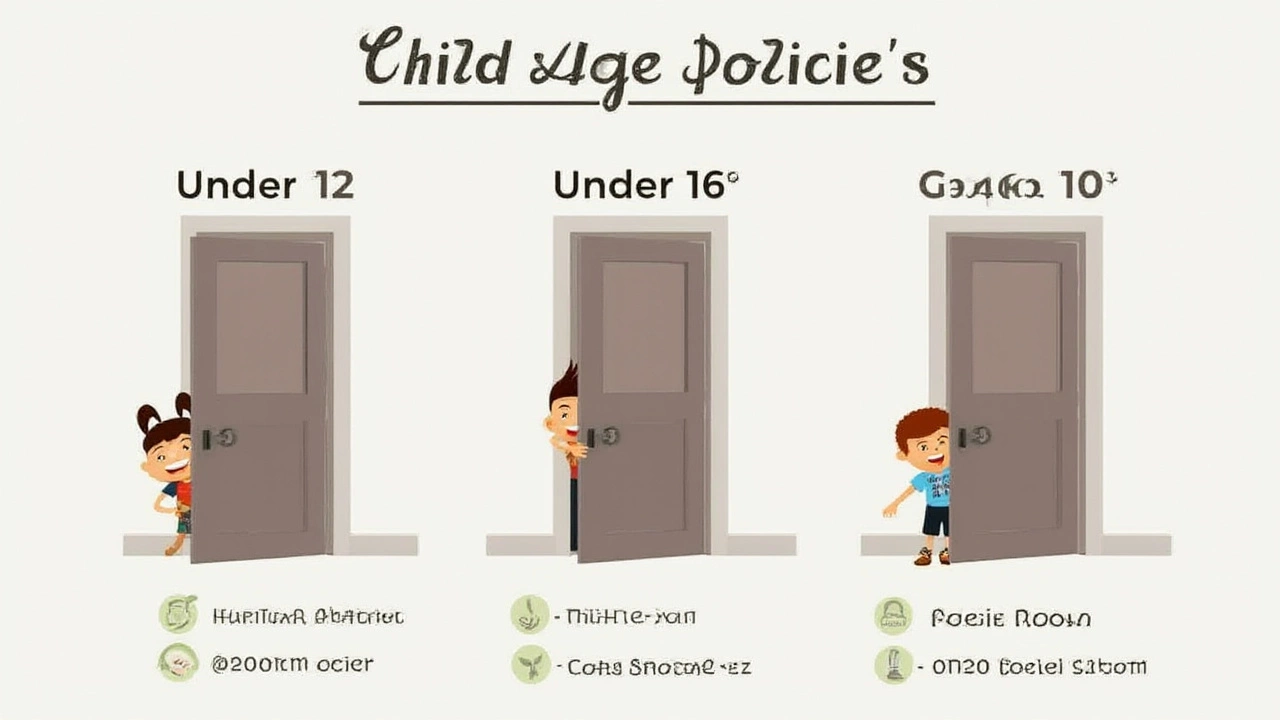What Age Counts as a Child in Hotels? Rules, Tips & Booking Advice

Ever tried booking a hotel for your family and gotten totally lost in the fine print? "Children under 12 stay free." "Kids up to 16 pay half price." Or my personal favorite: "Child age limits vary by property." The world of hotel kid policies is a wild patchwork—no universal rule, just a maze of different ages, rules, and hidden costs. As a mom and frequent traveler, I’ve learned to triple-check before clicking "book." The catch? Hotels don’t agree on what age is considered a child, and this can mean surprises at check-in, extra charges, or the kind of awkward conversations everyone wants to avoid after a long journey.
The Real Reason Hotels Can’t Agree on Child Age Limits
Hotel policies on what age counts as a child are basically all over the map—and it’s not just random. Unlike with airlines, where a child is generally someone under 12 (and a lap infant is under 2), hotels decide their own rules. Why? Three main reasons. First, local laws about occupancy and safety may force hotels to set certain limits. For example, fire codes might say how many people can stay in a room, but not what ages count, so hotels fill in the blanks. Second, hotels compete to attract families with “kids stay free” deals, so their policies become marketing tools. Third, profit. Charging for older kids or setting lower age limits for ‘free’ stays brings in more money when families book.
Big hotel chains often set age guidelines, but local franchises can tweak them. Marriott properties, for instance, usually let kids under 12 stay for free in the same room, but some European Marriotts cap children at under 17. Hilton might say children are under 18 in the USA, but you’ll find other Hiltons especially overseas marking the cutoff at age 12. Boutique hotels and independent places may have their own quirky number—sometimes everyone over 6 is considered an adult. If you’re traveling across continents, expect age definitions to change, even within the same brand.
Why does this matter? Because if your 15-year-old is classified as an adult in Paris but a child in New York, that’s a big deal for your budget and your sleep setup. Ignoring these subtle differences can lead to fees at check-in, a sour mood, or a scramble for a bigger room. The key takeaway: always check _the_ specific hotel, not just the chain or city, for the real age cutoff.
How ‘Child’ Is Defined in Major Hotel Chains
If you’re booking with a big-name hotel, you might think the age policy is cut-and-dry. But even the giants mix things up. Here’s a quick look at the current policies (as of 2025):
| Hotel Brand | Child Age Limit (Free if in Same Room) | Region Variance |
|---|---|---|
| Marriott | Under 12 | Europe: varies by country; U.S. often up to 17 |
| Hilton | Under 18 (U.S.) | International franchises may use under 12 |
| Holiday Inn | Under 18 | Most global locations stay consistent |
| Best Western | Under 12 | Some flexible family policies by hotel |
| Accor | Under 12 | Children over 12 often pay adult rates |
But here’s where it gets tricky: "stay free" almost always means using existing bedding. Need an extra bed? Boom—extra charge, and the ‘child’ may suddenly need to be booked as an adult. Similarly, breakfast might not be included for kids above a certain age (sometimes as low as 6 or 8), and "child" rates on breakfast buffets or dinner differ wildly. Don’t assume—one London Sofitel I booked wanted to charge my 11-year-old full price for breakfast while letting my 9-year-old eat free.
Hotels in Asia tend to have lower child age limits for free stays (typically under 12, sometimes under 6). Middle Eastern hotels might be more generous, with kids under 17 staying free, especially in resorts. In much of Europe, you’ll see a cutoff at ages 12-14, while U.S. hotels can range anywhere between 12 and 18. Always check the specifics when traveling abroad.
Online travel agencies (OTAs) like Booking.com or Expedia often force you to enter your children’s ages and then show rooms or rates accordingly. This can help filter surprises—but read the fine print to make sure it isn’t just the OTA’s blanket rule but matches the actual hotel policy. Still not clear? Email customer service or call—better to ask twice than pay double.

The Hidden Impact of Child Age Cutoffs on Your Booking Price
This all sounds like minor details until you realize it can mean hundreds of dollars (or euros, pounds, or yen). The difference between a 12-year-old and a 13-year-old in policy terms is often not much in real life, but at a hotel desk, it means extra beds, extra fees, sometimes separate rooms—which, by the way, parents hate. That’s why so many families fudge child ages or try their luck at check-in, but that’s risky; hotels have been known to actually check passports against booked ages, especially in countries where occupancy has legal weight.
For example, imagine you book a double room for two adults and one child “under 12” in Bangkok. Your child’s birthday is the week before you fly—and now they’re 12. If the hotel decides 12 is not “under 12,” you’re suddenly paying more, possibly for another room, or needing to justify the booking at the front desk after a red-eye flight. Or consider those family rooms advertised for "2 adults + 2 children under 12"—if even one child breaks the age rule, you’re pushed into a suite or adjoining rooms, usually at a hefty markup.
Bargain websites like Trivago or Kayak rarely mention these nuances. Hotel direct websites may, but even then, the English-language notes can be vague or non-existent. Traveling with kids means planning for these curveballs. Pro tip: take a screenshot of any offer, including date and time, as proof if there’s a dispute at reception.
Here’s another bit that gets people: kids clubs, pools, and spas inside hotels don’t always match up with room-age policies. A hotel might let a 15-year-old stay “free,” but bar them from the pool after 6pm because only "children under 12" are allowed then. Some family resorts include buffets for “kids under 11” while treating older teens as adults. If you’re relying on perks and amenities, check the separate age rules—hotels can and do enforce them strictly, especially in high season.
Strange Rules and Regional Differences That Trip Up Families
North America tends to be the most generous with age cutoffs, while Europe, Asia, and South America often define "child" much more narrowly. For instance, in Germany, many hotels set the child limit at 14 or younger; after that, it’s adult prices, even for a petite 15-year-old. Japanese hotels often set the bar lower, with age 6 as the cutoff—typically to match elementary school years. Family-run hotels or B&Bs may fudge policies for children under 3, offering cots or shared beds for free. But teens? Rarely counted as children in pricing, especially for breakfast or dinner plans.
The Caribbean or Mexico’s all-inclusives complicate things further. Here, ages for the child rates are tightly policed because of buffet and activity costs. Many all-inclusive resorts charge full adult rates for kids 13 and up, even if they can’t legally drink, and limit kids’ club activities by age brackets, often capping "teen" facilities at 16 or 17. Expect strict wristbands, check-in checks, and sometimes spot-checks at sit-down dinners—to make sure kids don’t sneak in as younger for free.
Hotels in the UAE or Qatar can be more flexible, offering family suites for up to four children under 16, but, oddly, not including meals for kids after age 6 unless you pay extra. Then there are Swiss or French mountain hotels where anyone over age 10 must have their own lift pass—so the family room is a bargain, but ski costs double. In big cities, hotel policies are often driven by limited space and local laws, so family rooms might not exist at all—pushing families into two rooms with, you guessed it, adult pricing for all teens.
Another odd case: child ages for package deals versus a la carte booking. Sometimes, booking a family "package" lets your 16-year-old count as a child for room and meals, while booking the pieces separately knocks them into adult status. Always compare both routes. And then there are the promos—Mother’s Day deals might let "kids under 13" stay for free with brunch included, but only if you mention the promo code or book direct. Don’t assume—double check every detail.

Tips to Avoid Surprises and Score the Best Family Hotel Deals
All these confusing, shifting rules shouldn’t ruin your family trip. Here’s how savvy travelers make sure child age rules work for—not against—them:
- what age is considered a child for hotels: Always check the direct hotel policy, as chain and booking site info sometimes doesn’t match up. Email or call the hotel; don’t rely on booking engines alone.
- Book refundable rates if your child is near the age cutoff and could "age up" at check-in.
- Bring copies of confirmation emails showing paid rates and any "child free" notes, and take screenshots. If the hotel website was vague, showing your proof can help.
- Look for family packages—they often have friendlier age rules and include perks like free meals.
- Don’t fudge ages. Some hotels in Europe and Asia check passports, and the risk of being charged adult rates (or even denied check-in) isn’t worth it.
- If breakfast or half-board isn’t included for older kids, check nearby bakeries or cafés. Sometimes you’ll pay less than the hotel’s "child" surcharge.
- Ask for a rollaway or cot upfront, and confirm the price. Sometimes a small fee beats the cost of a second room.
- Double-check policies on kids’ clubs, pools, or activity zones—often, age rules differ by amenity, not just by room.
- Traveling with a larger family? Look for apartment hotels or suite-style rooms where everyone can stay together under "family" pricing.
- If all else fails, try negotiating at check-in for a better deal, especially during low season or at less-busy properties.
Family travel is complicated enough without worrying about what a "child" means to your hotel. A few quick checks can save you money, embarrassment, and headaches—and maybe keep everyone in the same room. When in doubt, ask. The front desk has heard every variation of this question—they’d much rather clear it up before you arrive than have an awkward moment when you’re all tired, hungry, and just want your key.